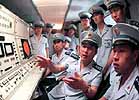| . |  |
. |
 Taipei (AFP) September 20, 1999 - US spy satellites could be used to help Taiwan intercept Chinese missiles in the event of a mainland attack on the nationalist island, the United Daily News reported on Monday.
Taipei (AFP) September 20, 1999 - US spy satellites could be used to help Taiwan intercept Chinese missiles in the event of a mainland attack on the nationalist island, the United Daily News reported on Monday.Military sources told the paper that granting Taiwan access to US satellite intelligence was one of the key issues to be discussed by a mission of US defence officials currently in Taipei. The delegation has been tasked with assessing the island's air defence capacity and drawing up recommendations for upgrading it, the News said. The paper said American satellites were able to trace the flames of Chinese missiles immediately after they are launched. If Taiwan had immediate access to this intelligence it would gain 15 minutes in preparing for a missile attack, it added. The US officials were reportedly due to begin working-level meetings with the Taiwanese military from Monday. The defense ministry refused to confirm that a US mission was in Taipei or to comment on the reported subject of its visit. "We have no comment on the report," a spokesman said. Tensions between Taiwan and the mainland have risen sharply since July, when Taiwanese President Lee Teng-hui characterised Taipei-Beijing relations as "state-to-state." China officially regards the island as a renegade province and has repeatedly refused to rule out pursuing reunification by force. Access to US satellite data would improve the effectiveness of Taiwan's PAC-II anti-missile defence system. Taiwan bought three batteries of PAC-II, the improved version of the Patriot missiles which made global headlines during the Gulf War, from the US in 1993. The three units are positioned to defend the densely-populated greater Taipei area. Taiwan is considering buying more Patriots and is planning to buy two US long-range radar systems capable of giving early warning of any Chinese missile launch. The visit by the US mission was initially scheduled for July. But Lee's "state-to-state" comments and Washington's desire to mend fences with Beijing after the NATO bombing of the Chinese embassy in Belgrade led to it being postponed, the News said. Beijing regarded Lee's remarks in July as a shift away from the "one China principle." The Chinese People's Liberation Army launched missiles into shipping lanes off Taiwan in mid-1996 to intimidate the island ahead of its first democratic presidential elections. Copyright 1999 AFP. All rights reserved. The material on this page is provided by AFP and may not be published, broadcast, rewritten or redistributed.
Asian MilSpace Issues At SpaceWar
Missile Defense at SpaceWar
|
| |||||||||
| The content herein, unless otherwise known to be public domain, are Copyright 1995-2016 - Space Media Network. All websites are published in Australia and are solely subject to Australian law and governed by Fair Use principals for news reporting and research purposes. AFP, UPI and IANS news wire stories are copyright Agence France-Presse, United Press International and Indo-Asia News Service. ESA news reports are copyright European Space Agency. All NASA sourced material is public domain. Additional copyrights may apply in whole or part to other bona fide parties. Advertising does not imply endorsement, agreement or approval of any opinions, statements or information provided by Space Media Network on any Web page published or hosted by Space Media Network. Privacy Statement All images and articles appearing on Space Media Network have been edited or digitally altered in some way. Any requests to remove copyright material will be acted upon in a timely and appropriate manner. Any attempt to extort money from Space Media Network will be ignored and reported to Australian Law Enforcement Agencies as a potential case of financial fraud involving the use of a telephonic carriage device or postal service. |